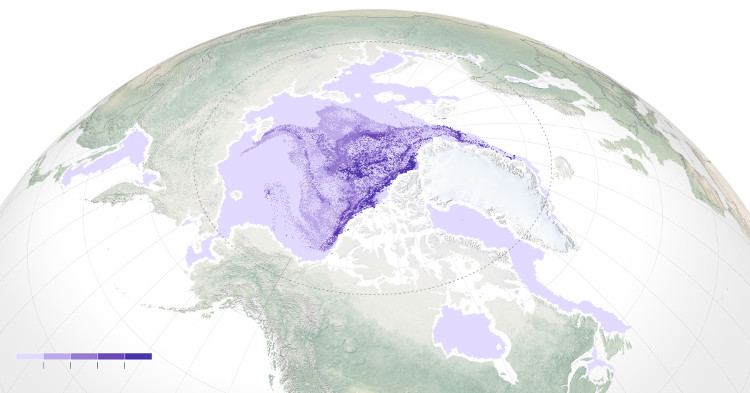Perennial ice in the Arctic is disappearing
In Arctic waters there are ice blocks that exist for years before melting. But this year has recorded an unprecedented low of ice blocks over 5 years old.
This further increases the likelihood of a prediction that by the middle of the century there will be no more ice sheets in the summer on the Arctic Sea.
As darker seawater and absorbing more heat to replace icebergs, the warming process of this region is accelerated. Old ice blocks are usually thicker than younger ones and therefore have better heat resistance. But when these old ice cubes disappear, the younger ice is more vulnerable to temperature attack.

As these old ice cubes disappear, the younger ice is more vulnerable to temperature attack.
According to the Colorado Center for Astrophysics Research at the University of Colorado, USA, the 1-year-old youth band formed in the winter and reached its peak around March. Then, when summer comes, the ice begins. tan. Some ice sheets melt when summer comes, but others continue to get thicker over the next winter and become 2-year-old ice. By the following summer, some 2-year-old icebergs continued to survive, becoming thicker. Like that, they become old ice. There are ice blocks that last more than a decade.
Today, the rest are mostly 1-year-old ice. While the oldest ice is constantly melting due to ocean currents pushing them south where there is warmer sea water, there are more and more ice cubes on the Arctic Sea.
This situation is extremely dangerous for animals here, such as species, because they use ice to escape predators, such as killer whales. When there is no ice, hunt more in the waters of narwhal, eat the narwhal meat and banish the narwhal from the area with the most food.
Mark Serreze, director of the National Snow and Ice Data Center, said the data was at a record level, which could be predicted by 2030 that the Arctic sea would remain ice in some seasons. .'Some argue that such predictions are too rigorous, perhaps until the 2040s. However, we follow it very well and there is a good basis to say that summer sea ice will no longer exist. '
- Arctic ice will melt?
- Interesting facts about animals living in the Arctic
- Arctic sea ice area is at a record low
- Every second 14,000 tons of water flows into the sea because the Arctic ice melts
- The volume of ice in the Arctic drops to a record low
- The Arctic lost three times as much ice as Belgium every day
- The extraordinary journey of the Arctic fox
- Arctic ice is melting record fast
- Why are coral reefs in the world disappearing?
- Arctic ice melted faster than expected
- Volcano under the Arctic ice
- Ice in the Arctic is likely to disappear by 2030
 Is the magnetic North Pole shift dangerous to humanity?
Is the magnetic North Pole shift dangerous to humanity? Washington legalizes the recycling of human bodies into fertilizer
Washington legalizes the recycling of human bodies into fertilizer Lightning stone - the mysterious guest
Lightning stone - the mysterious guest Stunned by the mysterious sunset, strange appearance
Stunned by the mysterious sunset, strange appearance